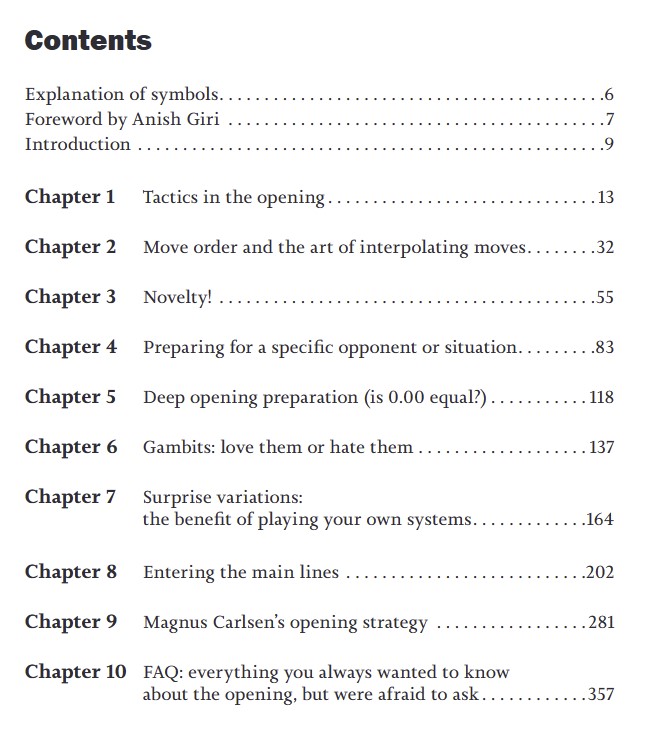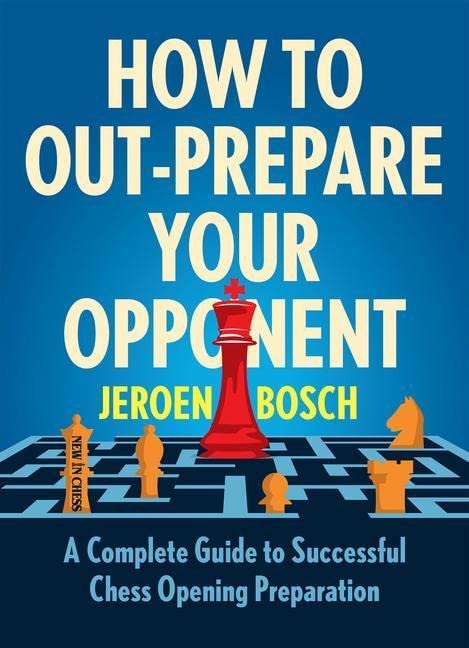Disclaimer 1: The following article contains several affiliate links to Amazon.com, meaning that if you go to Amazon and buy the recommended product (or some other product in an allotted period of time), the author of these lines will get a commission % from the purchase
Disclaimer 2: The following article is an excerpt from my article titled Best Chess Books 2022 in which I reviewed 20 chess books
Jeroen Bosch: How To Outprepare Your Opponent – A Complete Guide to Successful Chess Opening Preparation
As mentioned previously, 2022 was really a great year for chess books, during which an unprecedented number of interesting and fresh books were published.
One book of particular interest to the author of these lines was the book titled How To Outprepare Your Opponent, written by Jeroen Bosch and published by New In Chess in June 2022.
For those of you who are not familiar with Jeroen Bosch, he is a strong International Master who is very well regarded as a theoretician and opening specialist. He has been the coach of the Dutch national female team and is also a long-standing contributor to the New In Chess Magazine where he has been writing a column titled Secrets of Opening Surprises (SOS).
Thus, when I heard he is writing a book on the topic of opening preparation, I was very excited and knew I would very likely buy the book at the first opportunity. 1
So, how does one go about writing about the opening preparation? After the somewhat introductory chapter about the tactics in the opening, Bosch examines a number of extremely important practical topics related to the openings and opening preparation. He also tries to answer/discuss some „eternal” questions every tournament player is either constantly pondering, or not pondering enough at all.
Over the course of the ten chapters, some of the topics that are considered are:
- Importance of move-orders and transpositions in your opening play/opening preparation
- Value of novelties and dangers of overestimating them
- Preparing for a specific opponent
- Understanding that not all positions where the engine gives „0.00” are necessarily equal
- Are gambits playable in the 21st century? How to determine whether they are and how to decide when to employ them?
- The benefits of playing the mainlines compared to playing the sidelines
The penultimate chapter of the book tries to demonstrate all the previously discussed concepts and topics on a concrete example of Magnus Carlsen – a player whom Jeroen Bosch considers a model opening player due to his versatility and capability to choose an ideal opening variation for a very specific opponent. Finally, the book concludes with a FAQ-type chapter where the author tries to pose and answer all the questions that were left unposed and unanswered throughout the book.

I have personally found the book extremely useful and fascinating. Due to the serious work on my opening repertoire throughout 2021 and 2022, as well as returning to the classical tournament chess, 2 I started intuitively grasping some of the issues related to the opening preparation, as well as having some major doubts on how to approach every individual game. 3 With that in mind, the timing of the book was quite ideal for me, as it allowed me to reinforce my intuitive conclusions, answer some questions and clean up some doubts.
Of course, not every chapter was of equal use/interest to me. But due to Jeroen’s expertise, enthusiasm, and very interesting writing, I read the book from cover to cover and hopefully extracted some value.
Now, with that being said, I do feel the player of my level/profile is an ideal target audience for this book. I wouldn’t recommend a book on opening preparation to lower-rated players. I do feel a certain level of knowledge and experience is required to fully grasp the lessons/materials provided in this book. Besides, I believe many lower-rated players focus too much time on openings anyway and I am really not sure whether they would benefit from a book that specializes even further within this niche.
Thus, while I do believe this book is extremely valuable and insightful, I would heartily recommend it to, say, players above the 2000 level. 4 Of course, if you are lower rated yet still enjoy reading about openings/unconventional chess books, by all means, do purchase it.
But from the purely improvement/utility viewpoint, I do believe an average club player can get more value for the invested money by choosing something else.
- Being a big opening junkie I am
- I know, I know, how old fashioned. Taking my opportunities before it completely vanishes, I guess
- I am not sure how to explain why it only dawned on me in 2022 and not earlier in my career. Maybe because I used to play my Modern irrespective of what my opponent does in the past. Or because I just wasn’t thinking about that aspect of the game as much.
- Possibly even higher

